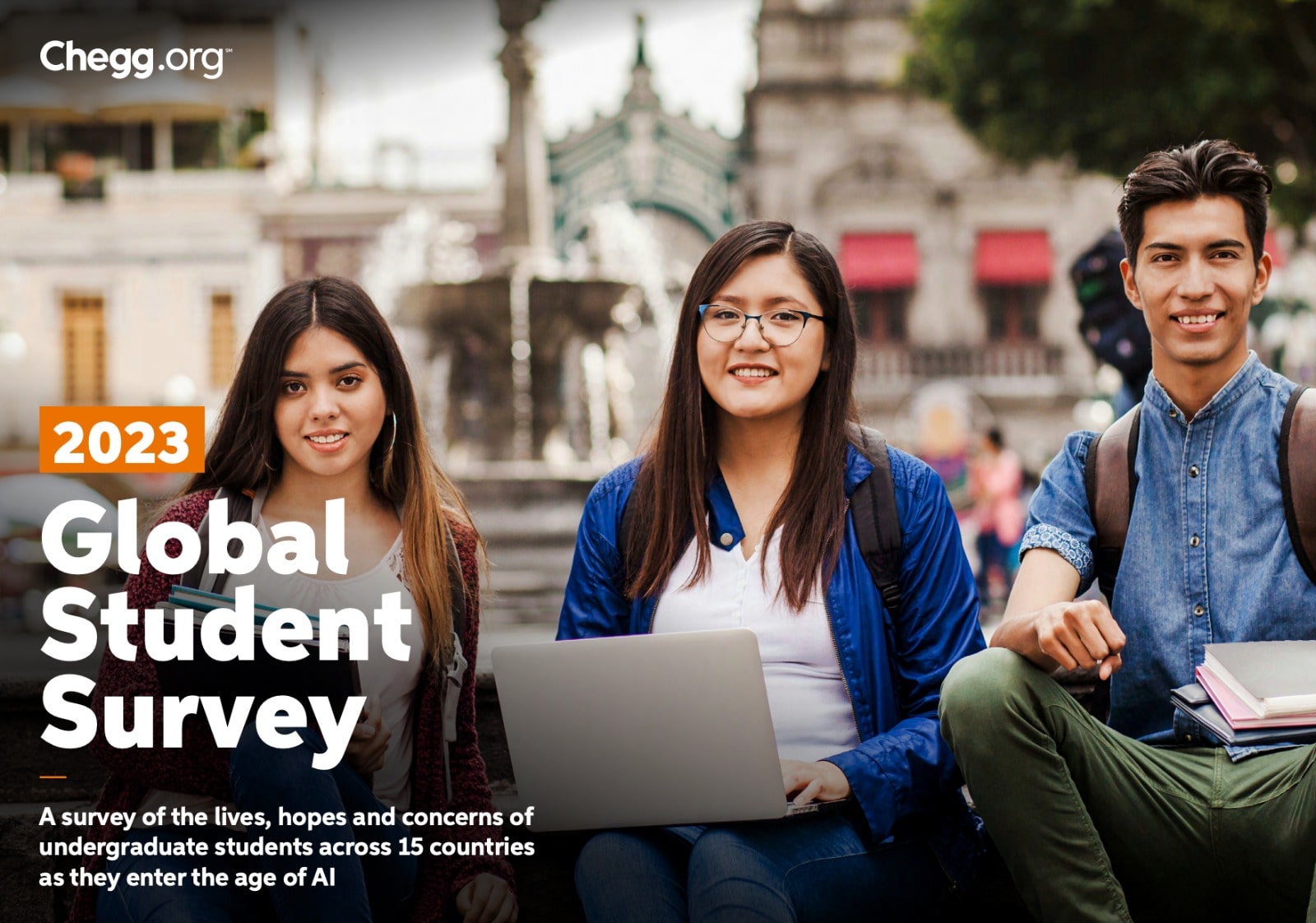Chegg.org, the non-profit arm of education technology company Chegg, today launches the Global Student Survey 2023 – the most comprehensive up-to-date survey of the lives, hopes and concerns of undergraduate students across 15 countries, as they enter the age of AI.
• Over half (62%) of Saudi Arabian students say they have used GenAI for their college/university studies – the second highest of all countries surveyed alongside Spain (62%), and after Kenya (63%). Of those students, 72% say they input a question into GenAI at least once or more daily – the third highest percentage for this category behind Turkey (82%) and Canada (80%).
• While Saudi Arabian students appear to view GenAI as a helpful learning support tool, they still see room for improvement, with 46% of all those surveyed calling for the involvement of human expertise in generating answers. At the same time, of the 62% of Saudi students who have used GenAI for their studies, 40% are concerned about receiving incorrect or inaccurate information.
• Almost half (48%) of Saudi Arabian students think their degree will be more useful than before in an AI-assisted workplace, the second highest of all countries after Kenya (53%).
• 81% of Saudi Arabian students say that, in general, all things considered, they feel happy. 77% say they feel optimistic, the second highest out of all countries after Kenya (80%).
Over half (62%) of Saudi Arabian students say they have used generative AI (GenAI) for their college/university studies – the second highest of all countries surveyed alongside Spain (62%), and after Kenya (63%). Of those students, 72% say they input a question into GenAI at least once or more daily, the third highest proportion in this category, behind Turkey (82%) and Canada (80%). However, while Saudi Arabian students see GenAI as a helpful learning support tool, they see room for improvement, with almost half (46%) of all those surveyed calling for the involvement of human expertise in generating answers. Further, 40% of the 62% who say they have used GenAI for their studies are concerned about receiving incorrect or inaccurate information.
The survey also highlights students’ desire for lower tuition fees, with over half (66%) of Saudi Arabian students agreeing that they would rather their college/university offered the choice of more online learning if it meant paying lower tuition fees. Similarly, over two-thirds (67%) of Saudi Arabian students say that if it were cheaper, they would prefer their college/university program to take a shorter amount of time to complete.
The new findings are among those published today by Chegg.org, the non-profit arm of education technology company Chegg. They are based on in-depth opinion polling by Yonder Consulting of over 11,000 post-secondary students aged 18-21 years across 15 countries, including 505 students in Saudi Arabia. This third Chegg.org Global Student Survey is the most comprehensive up-to-date survey of the lives, hopes and concerns of post-secondary students throughout the world as they enter the age of AI. Questions in this survey covered students’ views on learning in the age of AI, skills and careers, and their health, wellbeing and social attitudes. Chegg.org launched its Global Student Survey in 2021, during COVID lockdowns, and has conducted a survey every year since. The first survey was published in February 2021, and the second in April 2022.
“Although students are starting to adopt GenAI to support their learning, it’s clear they see room for improvement. Students want GenAI learning tools that provide accurate, reliable study support. Crucially, according to our survey, a top priority for improving the technology among all those surveyed in Saudi Arabia was the involvement of human expertise. An analysis of our internal research found that students are mainly using GenAI for writing tasks, and are not yet fully leveraging the technology for STEM subjects,” said Heather Hatlo Porter, Head of Chegg.org and Chief Communications Officer of Chegg, Inc.
The survey shows that over three-quarters (81%) of Saudi Arabian students feel their education is preparing them well for the job market. Further, 79% of Saudi Arabian students agreed that their university/college education is a good value for money, the fourth highest of all countries after Kenya (90%), South Africa (83%) and Indonesia (82%). Almost half (48%) of Saudi Arabian students think their degree will be more useful than before in an AI-assisted workplace, the second highest of all countries after Kenya (53%). At the same time, 77% say they would like their curriculum to include training in AI tools relevant to their future career, the third highest of all countries after Kenya (84%) and India (83%).
Of the 62% of Saudi Arabian students who have used GenAI for their studies, 44% say it helps them learn faster, while 43% say it frees up their time. When asked about how they mostly use AI for their studies, 45% of those who use GenAI for their studies use it to understand a concept or a subject, while 43% use it to prepare for presentations.
Among the 62% of Saudi Arabian students who have used GenAI for their studies, the main emotion they feel when using GenAI for their studies is curiosity: 42% said they mainly felt curious, while 21% said they mainly felt empowered.
Three-quarters (75%) of all Saudi Arabian students surveyed say that in view of the availability of free GenAI tools, colleges/universities should change the way they assess students. Among this cohort, half (50%) say there should be better guidance on the acceptable use of GenAI tools in assessments, and 41% say there should be more online assessments, the highest percentage for this option of all countries. A majority of Saudi Arabian students surveyed (66%) believe their university/college should promote the use of GenAI tools for assessed work, the second highest for this option after Kenya (72%).
The survey results also show how students view their professors’ continued adaptation to technological change since COVID-19. Just over two-thirds (67%) of Saudi Arabian students say their teachers know how to teach effectively online, while 27% disagreed with the statement. This is the third-highest percentage of students who say their teachers know how to teach effectively online, just behind Kenya (87%) and Canada (71%).
“By elevating the voices of students and listening to their concerns, we can gain profound insights into how to support them. Crucially, as we enter this new age of AI, we will better understand how to harness the full potential of this technology, enabling students to learn how they want, what they want, when they want, and in their preferred format – which will ultimately help them on their lifelong learning journey,” added Heather Hatlo Porter. “Our Global Student Survey also shows that students around the world are stressed, lack sleep, and have trouble meeting new friends. There is a pressing need for robust mental health support, so learners can make the most of their education and face the future with confidence.”
An overwhelming majority of Saudi Arabian students (81%) say that, in general, all things considered, they feel happy. Over three-quarters (77%) say they feel optimistic, the second highest out of all countries after Kenya (80%), an increase from 2022 when 65% said the same. Only 7% say they feel pessimistic, a decrease compared to 16% in 2022. Saudi students also feel hopeful about their finances, with 80% saying they feel hopeful about their finances in the future. Moreover, a vast majority (85%) of Saudi Arabian students agreed that their country is a good place to live, the fourth highest of all countries surveyed after Australia (93%), India (87%), and Kenya (86%).
KEY GLOBAL FINDINGS
· 40% of students worldwide say they have used GenAI for their university studies.
· 55% of all students surveyed worldwide say their top priority for improving GenAI is to see involvement of human expertise in generating answers. At the same time, one of students’ top concerns about using GenAI in education is receiving incorrect or inaccurate information – selected by 47% of the 40% globally who say they have used GenAI for their university studies.
· Of the 40% of students worldwide who say they have used GenAI for their university studies, 50% say they input a question into GenAI tools once or more a day – including 18% who say they do so six or more times a day.
· Of the 40% of students worldwide who say they have used GenAI for their university studies, 55% said they used AI commonly to understand a concept or subject, and 49% to research assignments and projects.
· 65% of all students surveyed around the world believe that given the availability of free GenAI tools, universities/colleges should change the way they assess students.
· 65% of students worldwide say that they would like their curriculum to include training in AI tools relevant to their future career.
· 67% of students worldwide say that if it was cheaper, they would prefer their university degree take a shorter amount of time to complete.
· 59% of students worldwide say they have experienced not sleeping enough, 54% have experienced daily feelings of anxiety, and nearly half (46%) have suffered academic burnout.
· 65% of students around the world say they currently feel optimistic, while just 16% say they currently feel pessimistic.
· 71% of students globally agree that their country is a good place to live.

